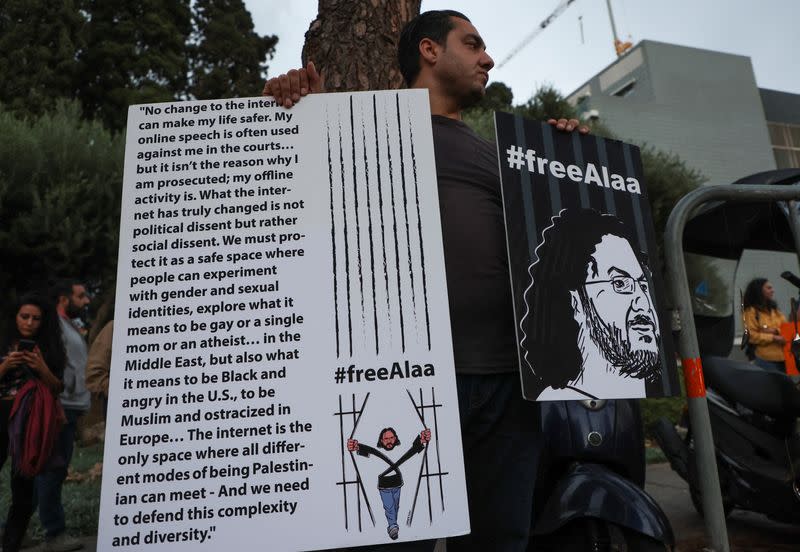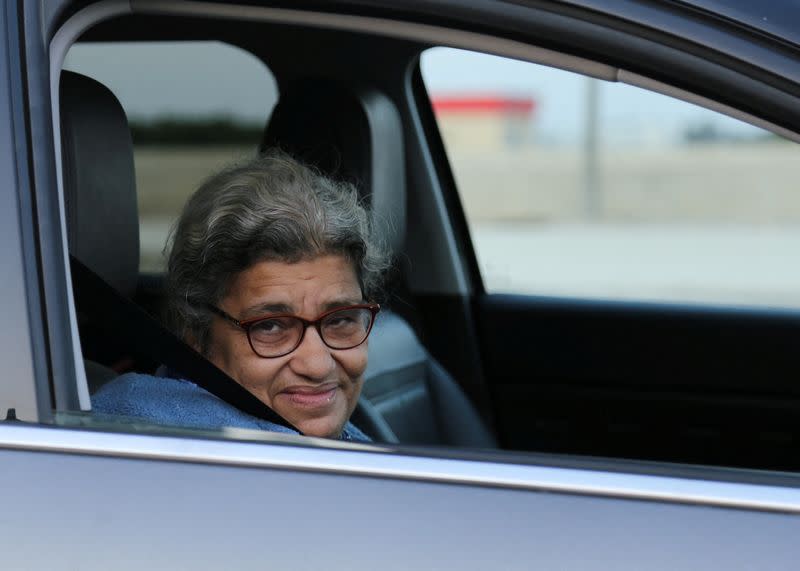Egyptian authorities intervene in prisoner's hunger strike, family says
By Farah Saafan and Aidan Lewis
SHARM EL-SHEIKH, Egypt (Reuters) - The family of jailed Egyptian-British hunger striker Alaa Abd el-Fattah said on Thursday they had been informed by prison authorities that medical intervention was taken to maintain his health, four days after he escalated his protest.
Abd el-Fattah, who has been on hunger strike since April 2, had said he would stop drinking water on Sunday to coincide with the opening of the COP27 climate change talks that Egypt is hosting in the Red Sea resort of Sharm el-Sheikh.
Khaled Ali, a lawyer for Abd el-Fattah, went to the prison northwest of Cairo where the activist has been held after receiving a rare authorisation to visit from the public prosecutor, but said he was denied access on the grounds that the permit carried Wednesday's date.
"Permits are normally valid for a week," Sanaa Seif, one of Abd el-Fattah's sisters, told Reuters. "They're just throwing us in bureaucratic loopholes."
Abd el-Fattah's hunger strike has loomed over the U.N. talks, with Seif flying in to campaign for his release, and British Prime Minister Rishi Sunak raising the issue with Egyptian President Abdel Fattah al-Sisi.
Abd el-Fattah's mother has been making daily visits to the prison this week. She has received no news from her son, but said prison officials spoke to her outside the gates on Thursday.
"They said medical procedures were implemented to maintain his health and that legal entities have been informed," Laila Soueif told Reuters by phone. "Nobody has officially notified us with any action that has been taken."
Without water, Abd el-Fattah's health could rapidly deteriorate and the United Nation's rights agency has expressed concern for his life.
Egyptian officials have not responded to Reuters requests for comment. Late on Thursday, Egypt's public prosecution issued a statement saying a medical report had shown Abd el-Fattah to be in "good health" and said this indicated his hunger strike was "questionable".
Abd el-Fattah's family said in social media posts that the statement was packed with inaccuracies.
The blogger and activist rose to prominence in Egypt's 2011 uprising before being swept up in a far-reaching crackdown on political dissent after Sisi, then army chief, led the 2013 ouster of Egypt's first democratically elected president, Mohamed Mursi.
Rights groups say tens of thousands of people have been arrested since then including Islamists, leftists and liberals. Sisi and his supporters say security and stability are paramount.
Another detainee, Alaa al-Salmy, died in a prison on the outskirts of Cairo in October after a two-month hunger strike, according to Egyptian rights groups.
'STILL IN PRISON'
Abd el-Fattah was sentenced most recently in December 2021 to five years on charges of spreading false news, the same month he gained British nationality through his mother.
He is on hunger strike against his detention and prison conditions. British officials have unsuccessfully sought consular access to visit him in prison. Soueif said she was not told the nature of the medical intervention.
"They say he's still in prison," she said on Thursday. "They refused to allow me to wait outside prison, refused to receive any letters from me."
Abd el-Fattah's family said in a statement: "We are demanding information on the substance of the 'medical intervention' and demanding that with the utmost urgency he is moved to hospital where lawyers and family can reach him."
U.S. President Joe Biden is due to join the COP27 summit on Friday, where U.S. administration officials say he will discuss human rights with Sisi. "I urge President Biden to do something, whatever way out that is needed," said Seif, Abd el-Fattah's sister.
The family's campaign for his release has brought a backlash from pro-government figures and media.
Local media have reported that an Egyptian lawyer submitted a legal case calling for Sanaa Seif's arrest for "conspiring with foreign agencies" and "incitement against the Egyptian state". Pro-government talk-show hosts have dismissed criticism of Egypt's human rights record.
One pro-government member of Egypt's parliament was escorted by U.N. security guards out of a news conference at COP27 on Tuesday when he refused to pass over the microphone after questioning the family's bid for an amnesty and for international support.
(Reporting by Farah Saafan in Cairo and Aidan Lewis in Sharm el-Sheikh; Editing by Frank Jack Daniel, Janet Lawrence and Lisa Shumaker)


